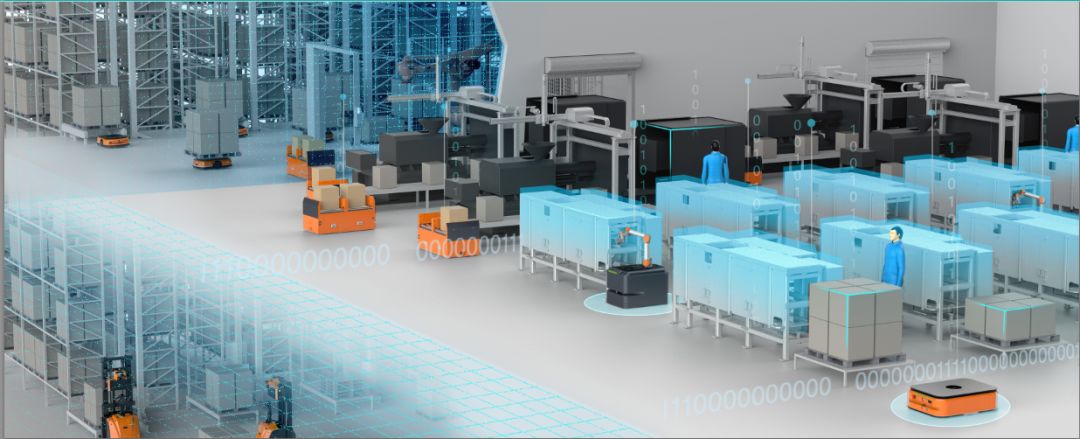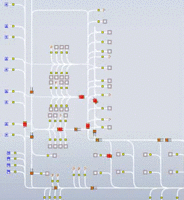The intelligent working ability of AMR robots has been clearly demonstrated in the edge node such as understanding, stopping accurately, and moving steadily. With AI Cloud, the edge nodes in the system transition to the next layer—the edge domain. From the RCS robot control and scheduling system, the iWMS intelligent warehouse management system to the VM algorithm platform, they are analyzed in sequence to unveil the future of intelligent manufacturing.

When intelligent manufacturing becomes the focus of innovation and capacity building for businesses, it is far from enough to put smart robots into complex manufacturing and achieve large-scale flexible production. Managing a team of smart robots and ensuring efficient collaboration between them is no easy feat.
The RCS robot dispatching control system (hereinafter referred to as “RCS”), which is one of the edge domains in the AI Cloud framework, is like the intelligent brain of a robot, from motion control to multi-robot collaboration. It allows mobile robots with individual intelligence to work together and move towards swarm intelligence.
Robots managed by RCS: Many types + large quantities

Multiple scenarios: During the production process, handling scenarios are often mixed, requiring the cooperation of multiple robots. RCS can mix and dispatch full series of multi-model robot products, open up key logistics nodes in the internal logistics link, and seamlessly connect storage handling-production line handling, warehouse handling-sorting handling and other mixed handling scenarios
Multiple vehicles: In the same warehouse, RCS supports the flexible handling of shelves/cages/pallets of different sizes.
AMR robot can be used for many types of shelves/racks
Multiple navigation methods: For different scene environments, RCS can satisfy the smooth switching between different navigation methods such as visual-inertial navigation and SLAM laser navigation.
In the future, warehouses will develop in the direction of scale, so the ability of cluster scheduling is very important. The scheduling framework is commonly used at present, that is, a single robot completes the path search, and the scheduling system is responsible for space management. This framework can support large-scale scheduling, but there are often systematic problems such as the planned robot path is not optimal.
The RCS solves the pain point of this appeal and can support 15,000 map nodes at the same time, realizing the cluster scheduling of 1,000 robots.
Intelligent brain endows robots with “high flexibility”, adapt to various in-plant logistics scenarios
For various resources such as robots, vehicles, and elevators in the in-plant logistics scene, RCS can perform collaborative management and unified scheduling. In addition, through the competition and cooperation game algorithm among multiple agents, RCS can dispatch multiple robots to adapt to various flexible internal logistics scenarios.
Intelligent brain deeply “mining data”: Robots work more scientifically
In the previous warehouse models, there may be unbalanced picking tasks at each workbench and robots “blindly” queuing up. The new RCS integrates machine learning algorithms on the basis of traditional operational optimization algorithms, making the robot work more scientifically and significantly improving scheduling efficiency. Based on big data analysis, RCS can intelligently decide the behavior of robots.
- Through the analysis and prediction of historical data, the system can estimate the time-consuming of picking shelves on the workbench, and then intelligently adjust the robot queuing strategy to shorten the task waiting time;
- Through the in-depth mining of data in each link of the digitalized factory, learn to predict the time of production tasks of automation equipment, and can schedule idle robots in advance to wait at a position closer to the task;

RCS dispatches AMR in real time
- By evaluating the congestion level of the route and the busyness of the workbench, reasonably control the order and timing of the handling of the shelves, and realize the task load balance of each workbench.
The RCS robot scheduling control system at the control layer realizes path planning, cluster scheduling, and task assignment for different series and types of robots, ensuring that robots can adapt to more complex scenarios.
In the intelligent manufacturing system, the mobile robot “learns” to work collaboratively, exhibiting group intelligence, and at the same time empowering and synergizing with human intelligence to achieve human-machine collaboration and promote intelligent manufacturing. Rozitek is willing to work with all partners to achieve in-depth cooperation in equipment, platforms, and technologies, continuously optimize and innovate logistics products and overall supply chain solutions, and jointly establish a smart logistics ecosystem.
To learn more about the AMRs – autonomous mobile robots and get a comprehensive automation solution, feel free to contact us. With a team of highly qualified and experienced engineers, Rozitek is confident to provide the most suitable solution and bring a different change for customers.
ROZITEK – INTELLIGENT INTRALOGISTICS SOLUTIONS
Email: info@rozitek.com



